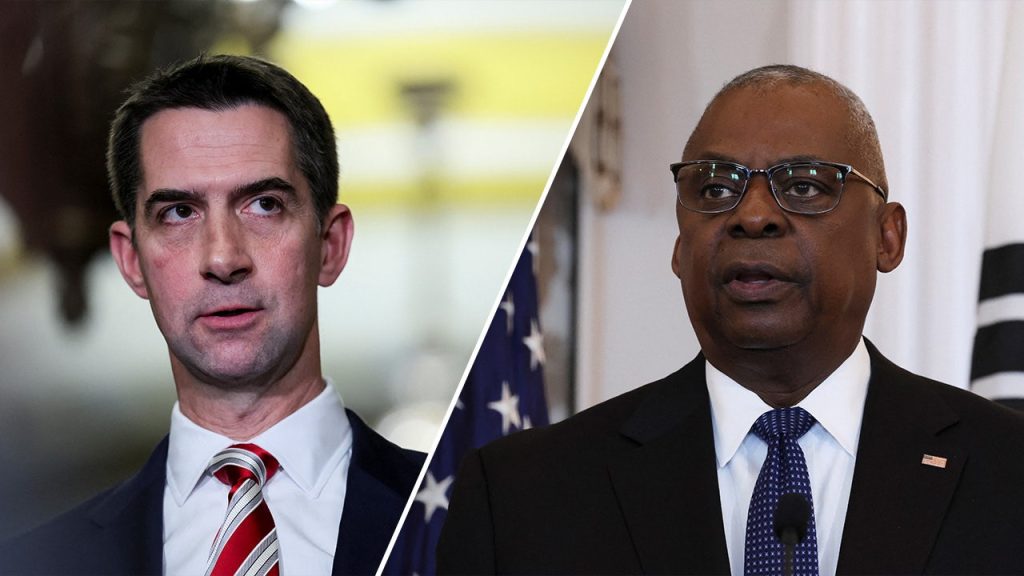Senator Tom Cotton’s demand for transparency regarding the Biden administration’s sale of border wall materials underscores the ongoing political and financial controversy surrounding the border wall project. Cotton’s letter to Secretary of Defense Lloyd Austin highlights concerns about the Department of Defense’s (DOD) role in disposing of excess materials at what some perceive as significantly undervalued prices. The senator’s request for comprehensive record-keeping, a detailed accounting of the disposal process, and a list of companies involved in purchasing the materials signifies a commitment to scrutinizing the administration’s actions and holding them accountable for potential mismanagement of taxpayer funds and national security implications. Cotton’s assertion that the sales constitute a “flaunting of urgent national security concerns” reflects a broader Republican perspective that views the border wall as a crucial element of national defense, a perspective starkly contrasting with the Biden administration’s approach.
The backdrop of this controversy is President Biden’s decision to halt construction of the border wall, a reversal of the previous Trump administration’s policy. The Biden administration, citing the 2024 National Defense Authorization Act (NDAA), defends its disposal of excess materials, asserting that a significant portion has been transferred to other government agencies like Customs and Border Protection, while the remaining materials have been sold through GOVPLANET, a platform for surplus government equipment. The administration emphasizes that the materials currently on sale through GOVPLANET are no longer government property, thereby placing them outside the DOD’s jurisdiction to control their sale. This legal justification, however, does not fully address Senator Cotton’s concerns about the original sale price and the potential loss of taxpayer money. The clashing narratives underscore the deep divisions surrounding border security policy and the differing priorities of the two administrations.
The financial implications of the border wall’s construction and subsequent dismantling are central to this debate. Reports indicate that sections of the wall have been sold at drastically reduced prices, described as “pennies on the dollar.” This perceived undervaluing of government assets fuels accusations of wasteful spending and mismanagement. Senator Cotton’s demand for a full accounting aims to uncover the specific financial details of these transactions, allowing for a thorough assessment of the potential financial losses to taxpayers. President-elect Trump’s accusations that the sales are “almost a criminal act” further escalate the political rhetoric surrounding the issue, framing the Biden administration’s actions as not only fiscally irresponsible but also potentially illegal.
The timing of these sales, occurring during the Biden administration’s lame-duck period, adds another layer of complexity. Senator Cotton’s letter, explicitly mentioning the upcoming transition of power to the Trump administration, suggests a belief that the sales are deliberately timed to complicate or obstruct the reinstatement of the border wall project. President-elect Trump’s public plea for the Biden administration to halt the sales reinforces this suspicion, implying that the current administration is intentionally creating obstacles for his future policy plans. The implicit accusation is that the Biden administration is prioritizing political maneuvering over responsible governance and national security concerns.
President-elect Trump’s assertion that repurchasing and rebuilding the wall sections will incur significant additional costs—”hundreds of millions of dollars”—further underscores the perceived financial mismanagement. This projection of increased costs serves to amplify the critique of the Biden administration’s actions, portraying them as not only wasteful but also strategically counterproductive. By highlighting the potential future expenses, Trump aims to demonstrate the concrete financial consequences of the administration’s current policy, bolstering his argument that halting the sales is a matter of fiscal responsibility and national interest.
Senator Cotton’s proactive stance, demanding transparency and accountability, reflects a broader effort to hold the Biden administration accountable for its actions during the transition period. The senator’s emphasis on preserving records and obtaining a comprehensive accounting suggests a commitment to investigating the matter thoroughly, potentially setting the stage for future congressional inquiries or oversight hearings. The strong language used by both Senator Cotton and President-elect Trump underscores the political significance of this issue, indicating that the border wall and its associated financial and policy implications will likely remain a central point of contention in the coming months and during the next Trump administration.

